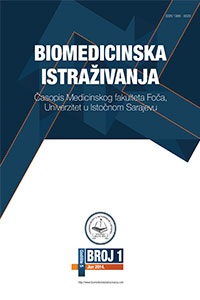Determination of arsenic content in tea samples available on Republic of Srpska market by atomic absorption spectrophotometry
DOI:
https://doi.org/10.7251/BII1902166DJAbstract
Introduction. Arsenic exists in various forms in nature and living organisms.
Toxic elements, including arsenic, which are present in some plants,
can severely damage haemopoietic, immune, nervous and reproductive
systems. For this reason, a content of heavy metals is one of the criteria for
the assessment of the safe use of plant material in the production of traditional
medicines and herbal infusions. This instigates the need for constant
and organized safety control of plants that are used as raw materials
in pharmaceutical industry.
The aim of this study is to determine the arsenic content in selected teas
which are available on the market of the Republic of Srpska.
Methods. The 10 g samples of 13 herbal and 3 fruit teas were mineralized
by dry ashing and arsenic contents were determined by the atomic
absorption spectrophotometer Agilent Technologies Series 200 with an
air-acetylene burner and D2 background correction.
Results. Mean arsenic concentrations in the herbal tea samples ranged
from 0.009 to 0.145 mg/kg. The lowest arsenic concentration in a single
sample of 0.007 mg/kg was found in Chamomile tea and Uva ursi collected
as a wild plant at elevation above 1200 m. The highest arsenic concentration
was found in the sample of Sambucus nigra tea (0.145 mg/kg). In
fruit teas, the arsenic concentration ranged from 0.014 mg/kg (Cranberry)
to 0.027 mg/kg (Fruit mix).
Conclusion. Arsenic content in all analyzed tea samples is below the value
stipulated by the national legislation.

